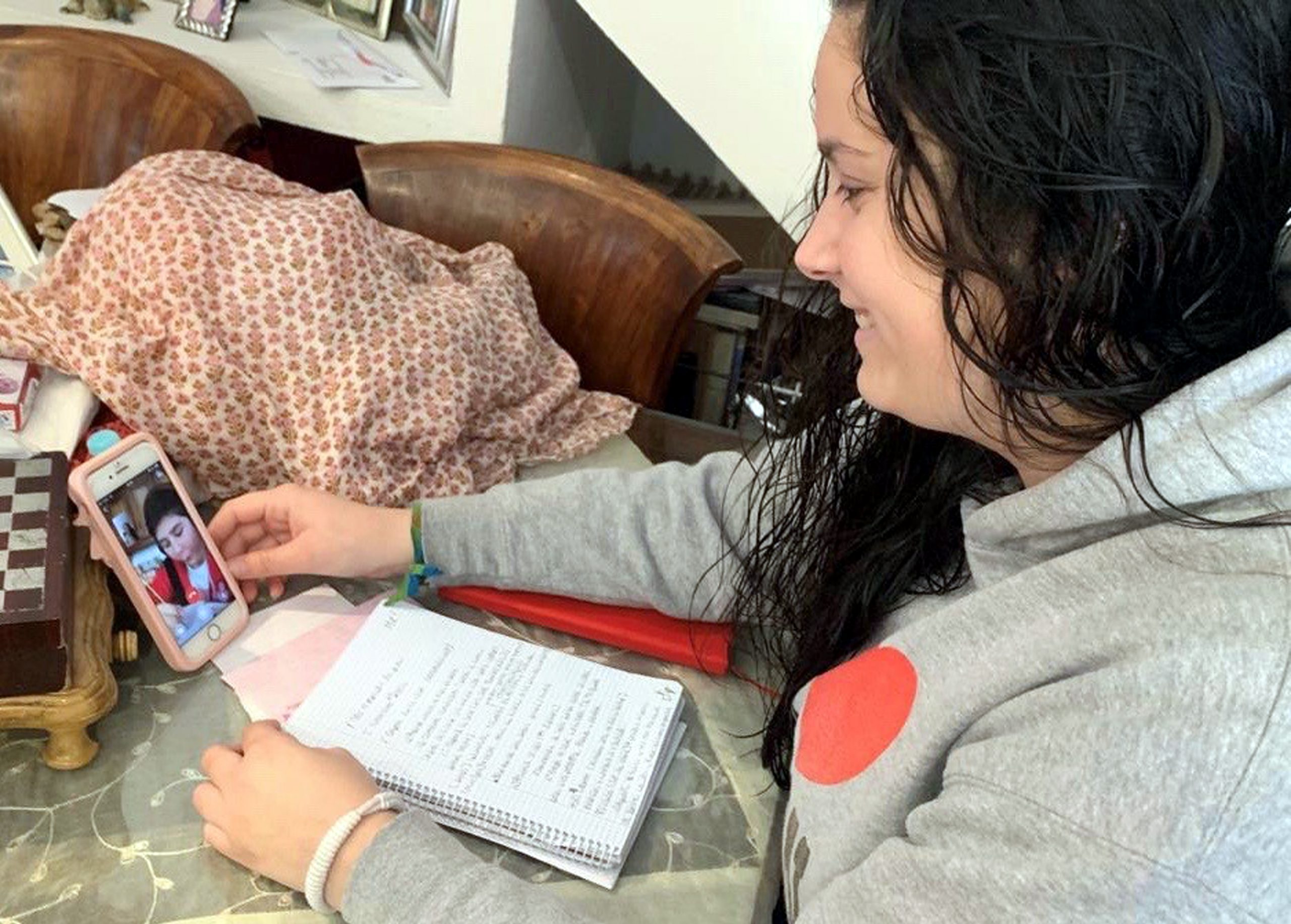The first onslaught of Covid-19 has affected numerous Roma families across Spain. In the beginning, the priority was to provide information and promote public health measures aimed at prevention and containment. However, since the declaration of the state of emergency across the nation on 14 March, we have been facing a new, more complex scenario, in which new social risks combine with the public health crisis and with the situation of especial vulnerability which already affected the Roma.
At the beginning of this crisis context, the Fundación Secretariado Gitano (FSG) decided to conduct a survey of 11,000 Spanish Roma by telephone who participate in FSG programmes with the aim of verifying how Covid-19 was affecting Roma families, identifying and trying to respond to the greatest needs they were facing. The survey was conducted in 68 cities from 30 March to 3 April 2020.
Some of the central conclusions of the survey were the lack of food and basic necessities in many families, the scarcity of economic resources, and the educational gap.
A large number of Roma families’ primary source of income is street vending, an activity which was already an unreliable income source, even before this crisis. The closure of street markets, and the impossibility of alternative activities such as collecting scrap metal, selling fruit or other activities which used to provide a day-to-day income, left many families facing a situation of social emergency, without any income, and with serious difficulties in accessing government aid for the self-employed (71 % of self-employed people are street vendors in the informal economy, often assisting family members, and are not registered as self-employed).
The situation of two-thirds of Roma in paid employment worsened since more than one-third lost their jobs, another third was temporarily laid off and 12 percent saw their working hours reduced. Only 24 percent did not see any change in their situation. More than half of unemployed Roma do not receive any kind of social welfare payment and find themselves lacking financial protection at this time.
Of particular concern in this crisis was the situation in slum settlements, where public health protection and public and social services are scarce. The health of residents is also poor due to existing medical conditions and the sanitary risks posed by their immediate environment, which means they represent a high-risk population.
Despite the resources provided by the government to relieve the situation of social emergency facing many people, and despite the recommendations to direct these resources to the most vulnerable families, the aid has not been arriving with sufficient speed.
There has been a lack of food and of basic necessities in many Roma households, which were already living in a state of extreme poverty and vulnerability: more than 40 percent experienced difficulty in accessing food and over one-third found difficulties to pay their electricity bills. At the moment of the survey, those families receiving help received it mainly from extended family or from neighbours (more than 40 percent), social organisations and parishes (more than 30 percent) and only 23.4 percent receive it from the local authorities (23.3 percent). Local authorities arrived late as providers of the aid initially needed.
This crisis is also leading to an even higher rate of school failure among Roma pupils, already victims of the digital divide and of educational inequality.
Schools shut, but no internet
The closure of primary and high schools led to the transformation of an education system based around digital resources, but a large number of Roma families do not possess the necessary equipment or skills to access and use these resources: only a third of minors have a computer and more than 40 percent of them do not have internet access or have it with limited data.
Furthermore, subject-related learning support, which previously pupils received in normal school-based classes and in support classes, is now more difficult to access. Pupils thus face serious difficulties in following their courses, combined with limited family support.
Although only 6.3 percent said they had suffered at least one incident of discrimination during this time, of being insulted or of being attacked because they are Roma, 37 percent believe that they are being stigmatised, which leads to a negative, unfair image of the Roma community in the context of the Covid-19 crisis.
The Spanish government has put in place some political and legislative measures to counter the negative impact of the crisis on most vulnerable people in Spain – recommendations on how to coordinate emergency aid and food delivery to the most deprived neighbourhoods and settlements.
However, some of these initiatives have not been implemented by regional and local administrations in a flexible, rapid way as an emergency situation requires, nor have they reached the most vulnerable groups, such as Roma. Social services have been slow in their provision of aid and in many cases, it has been the NGOs who are the first suppliers of emergency aid.
The enormous social consequences of this crisis have speeded up the approval by the central government of the most relevant social measure: the Minimum Life Income (MLI).Newly-introduced and aimed at families with the lowest income and with dependent children in their care, this is not only an opportunity to tackle extreme poverty, but also a subjective right to be protected by public authorities.
It will be the Spanish regional governments who now have the responsibility for enforcing and protecting this right, by creating educational, socio-personal and pre-employment plans tailored and adapted to the individual and his or her circumstances.
The MLI expands the coverage to families in need and will certainly help alleviate the distress of impoverished Roma families and overall, Roma child poverty.
While both the MLI and other emergency measures to counter the immediate basic needs ought to be operational as soon as possible, more structural measures and policies need to be already on the agenda to prevent and react to embedded and increasing inequalities in relation to the educational, employment, housing, health and equal treatment and non-discrimination gap between Roma and non-Roma that remains in Spanish society.
The situation of vulnerability and inequality affecting the Roma was already alarming before the crisis caused by Covid-19 in Spain, as everywhere across Europe. Based on data from 2018, the Comparative study of the situation of the Roma population in Spain in 2018 in terms of employment and poverty carried out by the FSG found that poverty and social exclusion affected more than 80 percent of Roma, with 46 percent living in extreme poverty. The child poverty rate stood at 89 percent, with 51 percent in a situation of extreme poverty. However, and contrary to the common belief that Roma families live on social welfare payments, only 32 percent of very poor Roma households receive such payments.
The study also revealed the low representation of Roma in the labour market, with those in work often being in insecure jobs with little social or legal protection. The unemployment rate was as high as 52 percent (more than three times the rate of 14.5 percent found in the general population). Roma women were at a clear disadvantage, with an employment rate of only 16 percent.
Only 53 percent of the economically-active were salaried workers (compared with 80 percent in the general population), while self-employed workers represented 47 percent (compared with less than 20 percent in the general population). This high proportion of self-employed workers is due to the high prevalence of street vending, which continues to be the main form of work for Roma people.
In relation to education, only 17 percent of Roma people over the age of 16 have completed compulsory secondary education or higher education. Six-out-of-10 Roma boys and girls do not finish compulsory secondary education.
Slums
Regarding the housing situation, more than 9,000 Roma families in Spain live in substandard housing which does not meet basic standards of habitability (around 40,000 people). Of these 9,000 households, 2,273 live in slum settlements (around 11,000 people).
Before this picture of disadvantage, one can easily imagine what the arrival of Covid-19 will have caused many Roma families. It has hit hard the most vulnerable Roma whose precarious living conditions have deteriorated even further, leaving them in a very fragile and unprotected situation.
—
This article was originally published in Covid-19’s impact on Spanish Roma (euobserver.com), written by Carolina Fernández (deputy executive director of advocacy) and Belén Sánchez-Rubio (director of the international department at Fundación Secretariado Gitano, an NGO working with Roma in Spain).



